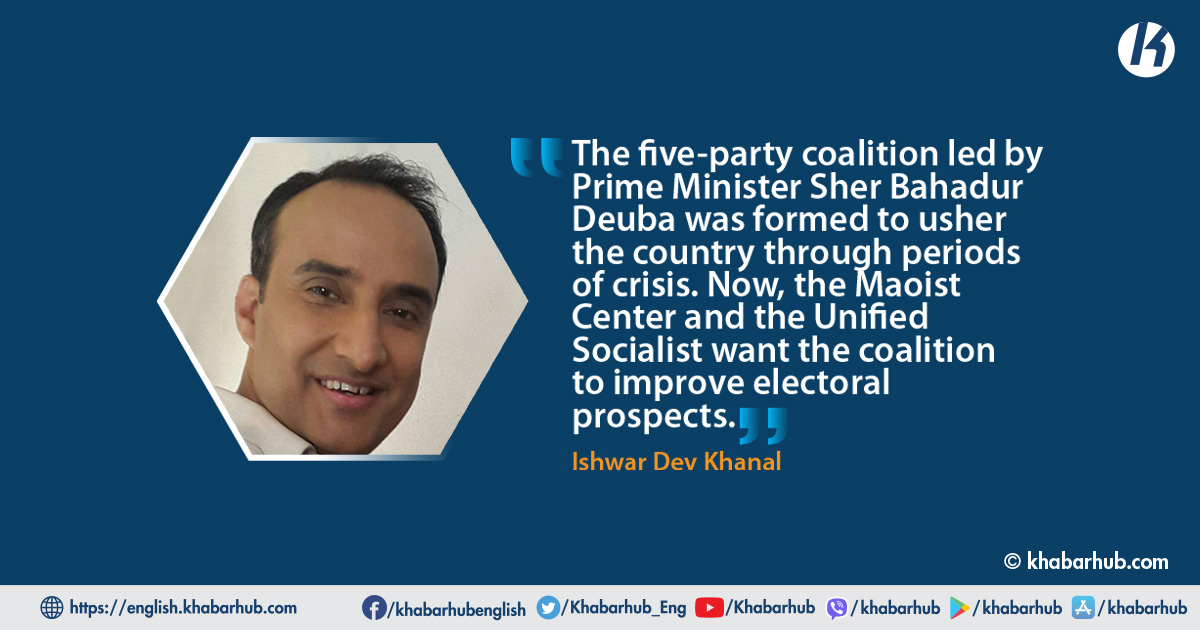0%

KATHMANDU: What have the last couple of years taught us about democracy and elections in Nepal?
The answer is: Political wrangling, unification and division, coalition culture, political instability, and electoral alliance have been the key issues that all these years have taught us.
In Nepal’s politics, there are neither permanent friends nor permanent foes. And Maoist supremo Pushpa Kamal Dahal “Prachanda” knows it well.
Therefore, he has been insisting on continuing the ruling alliance until the general elections as he has been doing the election math that would support his party to win both the local and general elections.
If the remarks of Prachanda and Unified Socialist Chairman Madhav Kumar Nepal are to be considered, they want to continue with the current ruling coalition with the Nepali Congress (NC) and the Janata Samajwadi Party until the next general election in a bid to throw their combined political muscle behind a single party – the CPN-UML.
Or else, they are pretty sure that contesting the elections individually could be disastrous for them as claimed by UML Chairman KP Oli.
On the other hand, Maoist leader Narayan Kaji Shrestha is hopeful that his party would become the second-largest party merely on the basis of electoral alliance with the Nepali Congress, and other ruling partners.
While Oli’s nationalism pitch has always been a strategy to win the elections, Prachanda during Friday’s meeting of the party’s central committee assured his party leaders that the current ruling coalition would continue till the elections and that the party need to focus on the elections.
Shrestha’s statement comes at a time when the onset of local election season in the country will set off a flurry of political activity as the ruling parties, particularly the Maoist Center and Unified Socialist, know well that they need to go hand-in-hand for a victory.
In Nepal, for example, several coalitions have been created. Therefore, coalitions and alliances will likely play a more decisive role in the elections.
But UML Chairman KP Oli has a different perspective. On Sunday, he said that the Prachanda’s party would be “finished” in a couple of months – most probably after the general election.
Consider what he said: “The Maoist center survived till now because of me as I had filled the air inside the balloon (Maoist) a couple of years ago.”
But Prachanda is hopeful that the ruling partner Nepali Congress would not break the alliance until the elections.
But if Nepali Congress General Secretary Gagan Thapa’s statement is to be considered, it was his party that rescued the country by forming the government under its leadership, and that his party would form the new government after the elections.
By saying so, it seems he is trying to take all credit for the political developments taking place in the country.
Thapa, too, is not in favor of an electoral alliance with Prachanda’s Maoist Center as he said, “People want political stability. Even though people gave a good majority to the Communists in the last election, the Communists failed to meet the people’s aspirations and spent all their time in squabbling and financial misappropriation.”
Both Oli and Thapa know very well that it’s no wonder if Prachanda, as in the past, changes his mind overnight – the latest being his u-turn in ratifying the Millennium Challenge Corporation.
UML Chairman Oli, too, knows well that the current ruling coalition is nothing but a “tricky proposition”.
Going back to the 2018 general elections, the electoral alliance between the CPN-UML and the Maoist Center came as a jolt to the Nepali Congress with the Communists electing to power with a dominant majority.
What has to be emphasized is that the political parties, dubbed as the engine of democracy, should try to pursue political power, and strive to retain it despite differences and political wrangling.
As the previous general election, UML Chairman Oli’s slogan technique of nationalism might not work well this time even though he might target the Maoist Center and the Nepali Congress by raising the issue of MCC in a bid to promote a sense of patriotism.
The main opposition party – UML – also appears to focus questions towards policy areas that uncover the intra-coalition rifts in the local as well as general elections.
While Oli’s nationalism pitch has always been a strategy to win the elections, Prachanda during Friday’s meeting of the party’s central committee assured his party leaders that the current ruling coalition would continue till the elections and that the party need to focus on the elections.
The parliamentary elections have, as always (except for the previous one), resulted in the formation of coalition governments in the country.
Since the political parties compete for votes, the coalition culture may lead to bargain to form another coalition government. Therefore, NC general secretary Thapa’s standpoint on contesting the elections individually could have some significance.